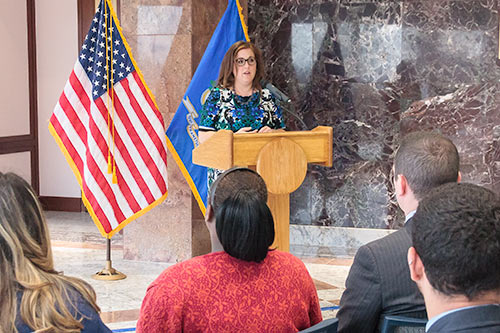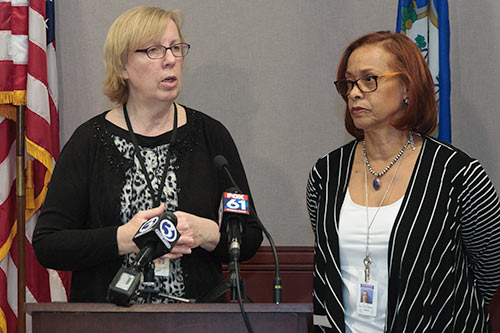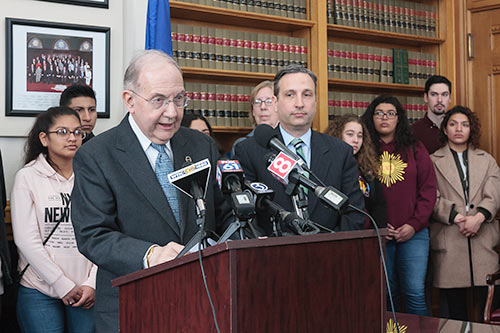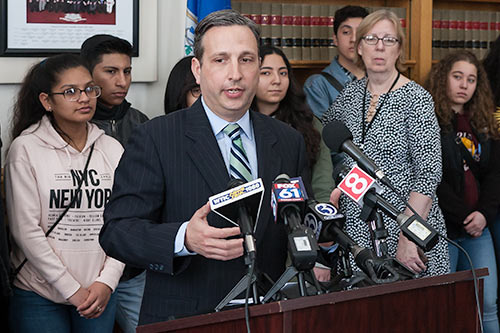Month: April 2018
Sen. Gerratana E-news: Fighting for Your Health
Senator Larson E-News: More Help for Crumbling Foundations; Update on the Democratic Values Agenda
Sen. Moore E-News: Summer Job Opportunity for Bridgeport Youth
Flexer Leads Senate Passage of Bill Protecting Access to Critical Services for Connecticut Veterans

Flexer Leads Senate Passage of Bill Protecting Access to Critical Services for Connecticut Veterans
New CHRO guidance ensures veterans with “bad papers” receive equal treatment when seeking employment opportunities

Following Wednesday’s unanimous Senate passage of a bill protecting Connecticut veterans with other-than-honorable discharges, Senator Mae Flexer (D-Danielson) and veterans advocacy groups announced new guidance to ensure that all veterans receive equal treatment in seeking employment opportunities during a press conference at the Commission on Equity and Opportunity’s Hartford office Thursday.
Senate Bill 284, An Act Concerning Benefits for Certain Veterans Who Have Been Diagnosed With Post-Traumatic Stress Disorder Or Traumatic Brain Injury Or Who Have Had An Experience of Sexual Trauma, would assist veterans with other-than-honorable discharges by ensuring that they can access critical state veteran’s benefits.
“I am proud to have led Senate passage of a critical piece of legislation yesterday that aims to improve the quality of life for our returning service members who have been diagnosed with post-traumatic stress disorder, or traumatic brain injuries, or have endured military sexual trauma. For these veterans in particular, readjusting to civilian life can be especially challenging,” Veterans Committee Co-Chair Senator Mae Flexer (D-Danielson) said. “Veterans who go without treatment because they are denied access to services are more likely to encounter homelessness, substance abuse, and commit suicide at a higher rate. We can and must do better to help those who served. I’m proud to have worked with my co-chair Senator Martin to lead this important step forward in our state, a step that is leading the nation in providing fairness and equity for all of our veterans.”
The new guidance by the CHRO clarifies that employers should afford individualized consideration to all job applicants, regardless of their military discharge status. This guidance follows the passage of a new law authorized by Sen. Flexer that prohibits discrimination against veterans.
Currently, some private employers categorically exclude job applicants with less-than-Honorable discharges from the military (colloquially known as “bad paper”). However, due to a number of discriminatory policies and practices, the military issues bad paper at a significantly higher rate to Black and Latino service members, LGBT service members, and service members with a disability. Accordingly, employers with blanket policies of rejecting these veterans during the job application process may run afoul of antidiscrimination law.
“Both the Connecticut Fair Employment Practices Act and federal law prohibit private employers from discriminating against job applicants with respect to race, sexual orientation, and disability,” said Cheryl Sharp, CHRO’s Deputy Director. “CHRO’s new guidance clarifies that employers should afford individualized consideration to all job applicants, regardless of their military discharge status. Employers should consider the nature of an applicant’s offense, how long ago the offense occurred, and whether it has any bearing on the duties relevant to the job in question.”
Statement from Senator Cathy Osten and Representative Toni Walker

Statement from Senator Cathy Osten & Representative Toni Walker

Senator Cathy Osten (D-Sprague) and Representative Toni Walker (D-New Haven), the Democratic co-chairs of the Appropriations Committee, today released the following statement:
“Tomorrow, Democrats on the Appropriations Committee will present a spending plan that reflects our values, funds our schools, promotes job growth, invests in our transportation system and protects the social safety net. We set out on this process committed to working with the Republicans—and we still are. However, we believe that it is important to call a budget vote and move the committee forward.”
The Democratic co-chairs will hold a media availability tomorrow at 10:30am at a location to be announced.
Highlights of Revisions to the Governor’s FY 19 Budget Proposal
Creates the Free 2 Start Initiative beginning our commitment to provide free college for all. In FY 19, 3155 qualifying freshmen will be eligible for the Free 2 Start Initiative
Reestablishes the Roberta B Willis Scholarship Fund—providing critical assistance to college students—how many kids
Restores funding for the Connecticard Program which provides necessary library services across the state and preserves federal funds
Reinstates funding for our Fire Training Schools
Restores funding for the Hispanic Programs in DSS providing vital funding to nonprofits in our cities and towns
Restores funding to the Department of Veterans’ Affairs to provide quality health care to our veterans.
Continues funding of our many tourism and cultural programs
Provides additional funding for the Care 4 Kids Program
Restores a total of $114.9 million in aid to municipalities. $33.1 million in town aid and $63 million in ECS and $18.5 million for magnet schools.
Increases assistance in the Department of Developmental Services for emergency placements and employment and day services
Funds the Medicare Savings Plan for seniors up to 170 percent of poverty, providing coverage to 134,000 people
Retains the car tax mill rate at 45, but uses current year mill rates
Increases funding for retired teachers health care
Continues the Enhanced Reimbursement rate for Primary Care Providers
Fully Funds the Renters Rebate program protecting 48,000 recipients
Restores funding for School based Health Clinics
Restores funding for Elderly Nutrition Program
Connecticut Senate Passes Bill Equalizing Access to Higher Education and Institutional Aid for Immigrant Students

Connecticut Senate Passes Bill Equalizing Access to Higher Education and Institutional Aid for Immigrant Students

In advance of an expected vote on the Senate floor, Senate President Pro Tempore Martin Looney joined colleagues and student advocates to push for passage of Senate Bill 4, An Act Assisting Students Without Legal Immigration Status with the Cost of College. (April 18, 2018)
Members of the Connecticut State Senate today passed Senate Bill 4, An Act Assisting Students Without Legal Immigration Status with the Cost of College, which—beginning with the winter 2020 semester—extends to certain students who lack legal immigration status the ability to apply for institutional financial aid to attend an in-state, public higher education institution.
The bill, which passed on a 30-5 bipartisan vote, extends eligibility for the aid to these students, to the extent allowed by federal law, if they meet certain residency, age, and criminal history requirements and if they file an affidavit about their intent to legalize their immigration status with the institution they are attending. The bill now heads to the House for consideration.
“Our state stands as a beacon of fairness, justice, and equality,” said Senate President Pro Tempore Martin M. Looney (D-New Haven). “Offering institutional financial aid to students regardless of immigration status is yet another sign of Connecticut’s commitment to fairness and equality. The Dreamers and beneficiaries of the DACA program have been here since they were very young; they put their faith in the United States and they are American in every way except for the circumstances of their birth. They are also a significant part of Connecticut’s future. Students who attain degrees from public universities and colleges in Connecticut are more likely to build careers in Connecticut. I am proud to stand with them today and I am proud that the Senate passed this important legislation.”
“Granting access to institutional aid is a matter of fairness. It is the right thing to do,” said Senate Majority Leader Bob Duff (D-Norwalk). “On the Great Seal of the United States is included the motto, E pluribus unum: Out of many, one. It is a recognition that this nation was built, and continues to be built, by a diverse array people. These students are Connecticut kids, and although it may sound cliché, they are our future.”
“I want to thank the members of the Higher Education Committee who worked together to negotiate a truly bipartisan bill that strikes a balance between concerns on both sides of this issue,” said Senate Republican President Pro Tempore Len Fasano (R-North Haven). “This bill represents an extensive, collaborative effort to help those working toward earning a college degree if they are on a direct path to citizenship. We want to encourage all young people in our state to pursue career paths that allow them to succeed, contribute to our state’s economy, and achieve the American dream. We also need to make sure financial assistance is protected and reserved for those who are on a path to citizenship and who are paying into this fund already. The best legislation is that which has been crafted with input from all sides.”
“At its core, this bill is about—and this issue has always been about—basic fairness for Connecticut students,” said state Senator Beth Bye (D-West Hartford), who is Senate Co-Chair of the legislature’s Higher Education and Employment Advancement Committee. “These students have come up through our public education system, they have endured challenges that many others have not, they have persevered, they have succeeded, and today we in the Senate allowed them access to the educational aid that they themselves have helped create. That is fairness. That is the right thing to do. And that is what America is all about: the chance to succeed through your own hard work.”
“Year after year, these students have been coming to the Capitol to share their stories, advocate for themselves, their communities, and their futures. It gives me great satisfaction to see their efforts come to fruition,” Senator Gary Winfield (D-New Haven) said. “Passing this bill in the Senate is a significant milestone. It is important that support for this bill comes from both sides of the aisle. When it comes up in the House, my hope is that we show these young people the best of Connecticut by passing it in a bipartisan manner in that chamber as well.”
“Undocumented students who live in our state and attend our public colleges and universities should be allowed access to the financial assistance from the pool that they all pay into,” Senator Mae Flexer (D-Danielson) said. “Connecticut Students for a Dream has been diligently advocating for this proposal for years. They have courageously told their stories and created the bipartisan bill we have today. I am thrilled that we are finally moving forward to provide equity for these students.”
SB 4 requires undocumented students to fulfill the following eligibility requirements to receive institutional aid:
- meet the requirements for in-state student classification or be an honorably discharged veteran of the United States armed forces;
- be 30 years old or younger as of June 15, 2012;
- have been 16 years old or younger upon arrival in the United States and have continuously lived in the country since that time;
- be free of felony convictions in all states; and
- have filed an affidavit with the institution they are attending stating that they have either filed an application to legalize their immigration status or will file one as soon as they are eligible.
Students who lack legal immigration status already must file such an affidavit in order to qualify for in-state tuition.
Winfield Applauds Senate Passage of Dreamer Bill

Winfield Applauds Senate Passage of Dreamer Bill
Legislation equalizes access to higher education and institutional aid for undocumented students

In advance of an expected vote on the Senate floor, Senator Gary Winfield joined colleagues and student advocates to push for passage of Senate Bill 4, An Act Assisting Students Without Legal Immigration Status with the Cost of College. (April 18, 2018)
Members of the Connecticut State Senate today passed Senate Bill 4, An Act Assisting Students Without Legal Immigration Status with the Cost of College, which—beginning with the winter 2020 semester—extends to certain students who lack legal immigration status the ability to apply for institutional financial aid to attend an in-state, public higher education institution.
The bill, which passed on a 30-5 bipartisan vote, extends eligibility for the aid to these students, to the extent allowed by federal law, if they meet certain residency, age, and criminal history requirements and if they file an affidavit about their intent to legalize their immigration status with the institution they are attending. The bill now heads to the House for consideration.
“Year after year, these students have been coming to the Capitol to share their stories, advocate for themselves, their communities, and their futures. It gives me great satisfaction to see their efforts come to fruition,” Senator Gary Winfield (D-New Haven) said. “Passing this bill in the Senate is a significant milestone. It is important that support for this bill comes from both sides of the aisle. When it comes up in the House, my hope is that we show these young people the best of Connecticut by passing it in a bipartisan manner in that chamber as well.”
SB 4 requires undocumented students to fulfill the following eligibility requirements to receive institutional aid:
- meet the requirements for in-state student classification or be an honorably discharged veteran of the United States armed forces;
- be 30 years old or younger as of June 15, 2012;
- have been 16 years old or younger upon arrival in the United States and have continuously lived in the country since that time;
- be free of felony convictions in all states; and
- have filed an affidavit with the institution they are attending stating that they have either filed an application to legalize their immigration status or will file one as soon as they are eligible.
Students who lack legal immigration status already must file such an affidavit in order to qualify for in-state tuition.
Connecticut Senate Passes Bill Equalizing Access to Higher Education and Institutional Aid for Immigrant Students

Connecticut Senate Passes Bill Equalizing Access to Higher Education and Institutional Aid for Immigrant Students

In advance of an expected vote on the Senate floor, Senate Majority Leader Bob Duff joined colleagues and student advocates to push for passage of Senate Bill 4, An Act Assisting Students Without Legal Immigration Status with the Cost of College. (April 18, 2018)
Members of the Connecticut State Senate today passed Senate Bill 4, An Act Assisting Students Without Legal Immigration Status with the Cost of College, which—beginning with the winter 2020 semester—extends to certain students who lack legal immigration status the ability to apply for institutional financial aid to attend an in-state, public higher education institution.
The bill, which passed on a 30-5 bipartisan vote, extends eligibility for the aid to these students, to the extent allowed by federal law, if they meet certain residency, age, and criminal history requirements and if they file an affidavit about their intent to legalize their immigration status with the institution they are attending. The bill now heads to the House for consideration.
“Our state stands as a beacon of fairness, justice, and equality,” said Senate President Pro Tempore Martin M. Looney (D-New Haven). “Offering institutional financial aid to students regardless of immigration status is yet another sign of Connecticut’s commitment to fairness and equality. The Dreamers and beneficiaries of the DACA program have been here since they were very young; they put their faith in the United States and they are American in every way except for the circumstances of their birth. They are also a significant part of Connecticut’s future. Students who attain degrees from public universities and colleges in Connecticut are more likely to build careers in Connecticut. I am proud to stand with them today and I am proud that the Senate passed this important legislation.”
“Granting access to institutional aid is a matter of fairness. It is the right thing to do,” said Senate Majority Leader Bob Duff (D-Norwalk). “On the Great Seal of the United States is included the motto, E pluribus unum: Out of many, one. It is a recognition that this nation was built, and continues to be built, by a diverse array people. These students are Connecticut kids, and although it may sound cliché, they are our future.”
“I want to thank the members of the Higher Education Committee who worked together to negotiate a truly bipartisan bill that strikes a balance between concerns on both sides of this issue,” said Senate Republican President Pro Tempore Len Fasano (R-North Haven). “This bill represents an extensive, collaborative effort to help those working toward earning a college degree if they are on a direct path to citizenship. We want to encourage all young people in our state to pursue career paths that allow them to succeed, contribute to our state’s economy, and achieve the American dream. We also need to make sure financial assistance is protected and reserved for those who are on a path to citizenship and who are paying into this fund already. The best legislation is that which has been crafted with input from all sides.”
“At its core, this bill is about—and this issue has always been about—basic fairness for Connecticut students,” said state Senator Beth Bye (D-West Hartford), who is Senate Co-Chair of the legislature’s Higher Education and Employment Advancement Committee. “These students have come up through our public education system, they have endured challenges that many others have not, they have persevered, they have succeeded, and today we in the Senate allowed them access to the educational aid that they themselves have helped create. That is fairness. That is the right thing to do. And that is what America is all about: the chance to succeed through your own hard work.”
“Year after year, these students have been coming to the Capitol to share their stories, advocate for themselves, their communities, and their futures. It gives me great satisfaction to see their efforts come to fruition,” Senator Gary Winfield (D-New Haven) said. “Passing this bill in the Senate is a significant milestone. It is important that support for this bill comes from both sides of the aisle. When it comes up in the House, my hope is that we show these young people the best of Connecticut by passing it in a bipartisan manner in that chamber as well.”
“Undocumented students who live in our state and attend our public colleges and universities should be allowed access to the financial assistance from the pool that they all pay into,” Senator Mae Flexer (D-Danielson) said. “Connecticut Students for a Dream has been diligently advocating for this proposal for years. They have courageously told their stories and created the bipartisan bill we have today. I am thrilled that we are finally moving forward to provide equity for these students.”
SB 4 requires undocumented students to fulfill the following eligibility requirements to receive institutional aid:
- meet the requirements for in-state student classification or be an honorably discharged veteran of the United States armed forces;
- be 30 years old or younger as of June 15, 2012;
- have been 16 years old or younger upon arrival in the United States and have continuously lived in the country since that time;
- be free of felony convictions in all states; and
- have filed an affidavit with the institution they are attending stating that they have either filed an application to legalize their immigration status or will file one as soon as they are eligible.
Students who lack legal immigration status already must file such an affidavit in order to qualify for in-state tuition.
Flexer Applauds Senate Passage of Dreamer Bill
Flexer Applauds Senate Passage of Dreamer Bill
Legislation equalizes access to higher education and institutional aid for undocumented students
Members of the Connecticut State Senate today passed Senate Bill 4, An Act Assisting Students Without Legal Immigration Status with the Cost of College, which—beginning with the winter 2020 semester—extends to certain students who lack legal immigration status the ability to apply for institutional financial aid to attend an in-state, public higher education institution.
The bill, which passed on a 30-5 bipartisan vote, extends eligibility for the aid to these students, to the extent allowed by federal law, if they meet certain residency, age, and criminal history requirements and if they file an affidavit about their intent to legalize their immigration status with the institution they are attending. The bill now heads to the House for consideration.
“Undocumented students who live in our state and attend our public colleges and universities should be allowed access to the financial assistance from the pool that they all pay into,” Senator Mae Flexer (D-Danielson) said. “Connecticut Students for a Dream has been diligently advocating for this proposal for years. They have courageously told their stories and created the bipartisan bill we have today. I am thrilled that we are finally moving forward to provide equity for these students.”
SB 4 requires undocumented students to fulfill the following eligibility requirements to receive institutional aid:
- meet the requirements for in-state student classification or be an honorably discharged veteran of the United States armed forces;
- be 30 years old or younger as of June 15, 2012;
- have been 16 years old or younger upon arrival in the United States and have continuously lived in the country since that time;
- be free of felony convictions in all states; and
- have filed an affidavit with the institution they are attending stating that they have either filed an application to legalize their immigration status or will file one as soon as they are eligible.
Students who lack legal immigration status already must file such an affidavit in order to qualify for in-state tuition.